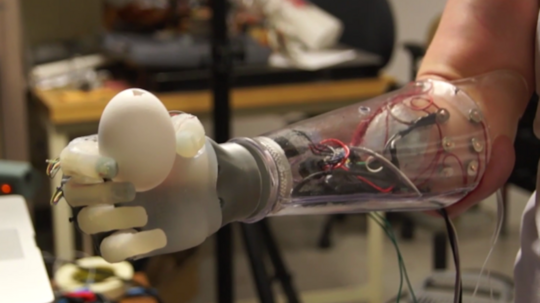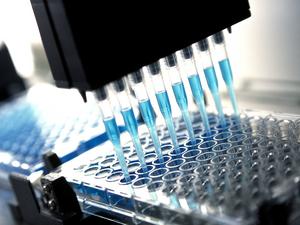
Advanced bionic prosthesis, which offer haptic feedback and more nuanced movements, offer the opportunity for amputees to get the most control and feel restored to a lost limb. But the technology can often cost tens of thousands of dollars, putting the limbs financially out of reach for many patients.
Aadeel Akhtar believes quality bionic limbs shouldn't have to cost thousands of dollars. In fact, the one he invented costs less than a tenth of the cost of state-of-the-art commercially available prosthetic hands.
Akhtar is the cofounder of Psyonic, a startup that has created a low-cost, high tech bionic hand. Their goal is to create an affordable advanced prostheses for low-income patients and amputees in the developing countries.
Psyonic's latest prototype uses just $550 in raw materials, compared to the $5,000 to $8,000 in raw materials used in comparable advanced prosthesis, the startup says. Using pressure sensors embedded in the finger tips, a myoelectric control board in the forearm and electromyographic sensors blow the elbow, all five of the Psyonic hand's fingers can individually flex and extend, and the thumb can rotate. The hand also has compliant joints, which, in Psyonic's tests, absorbs at least 10 times more energy on impact compared to a conventional rigid finger design. Each finger can still hold up to 38 pounds, and the assembled hand can hold over 50 pounds.

Psyonic uses a machine learning algorithm to detect different hand movements, including hand close, hand open, a fine pinch, a three-finger grasp, and rest. The startup says the hand can recognize different movements and responses after just a two minute training session.
Their hand is also 50th percentile female-sized (most are fitted to men), weighs 20 percent less than the average human hand, and is USB rechargeable.
Already Psyonic has outfitted two patients with the hand in Ecuador, who were able to feel light and strong touch, as well drive a car and pick fruit using the hand. They also fitted one US patient--a retired army sergeant who lost a hand to a roadside bomb in Iraq--with the hand, and he was able to grasp an egg without cracking the shell, hold a cup of water, and hammer a nail into wood.

Psyonic's next step is getting Class II medical device FDA approval, a process that will take up to a year of testing and consulting and cost up to $100,000. The startup is currently seeking to raise $250,000 on Indiegogo to cover these costs, as well as get the device covered by insurance, finish the prototype and manufacture the first 50 hands.
Akhtar, currently a University of Illinois Urbana-Champaign medical student, who received his PhD in Neuroscience and MS in electrical and computer engineering from the university in 2016, is working with a team of five engineers to bring Psyonic to life. Akhtar won the Illinois Innovation Prize last year for his work on Psyonic. His cofounder, Patrick Slade, is a recent UIUC alum and current graduate student in mechanical engineering at Stanford University.
"We aim to finish our prototyping and product designs by the end of the year, to obtain FDA approval and insurance coverage in 2018, and to start selling in 2019," the startup said on Indiegogo.
Note: The story has been updated to reflect the correct position of the army veteran.








